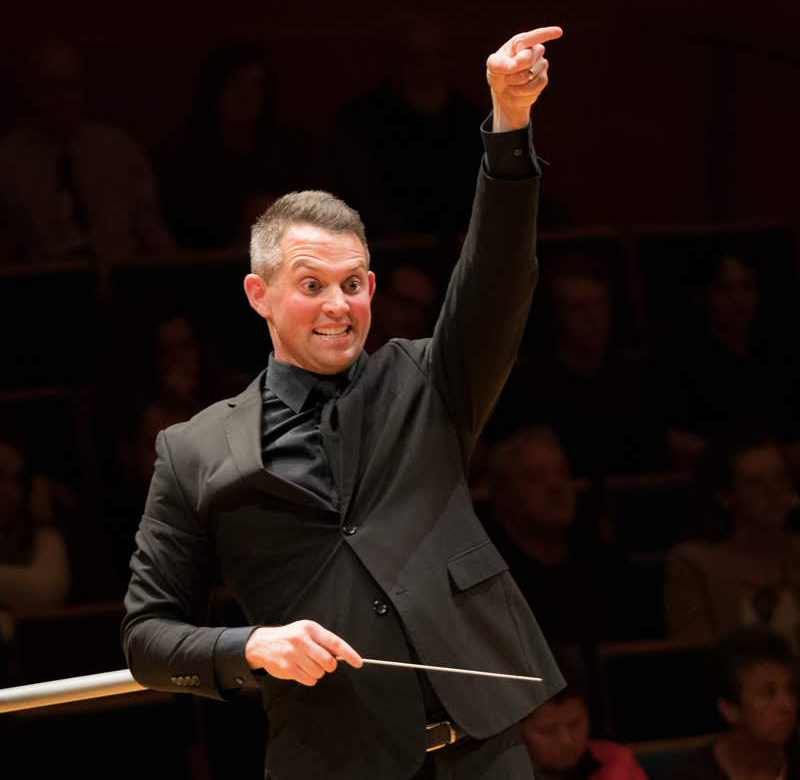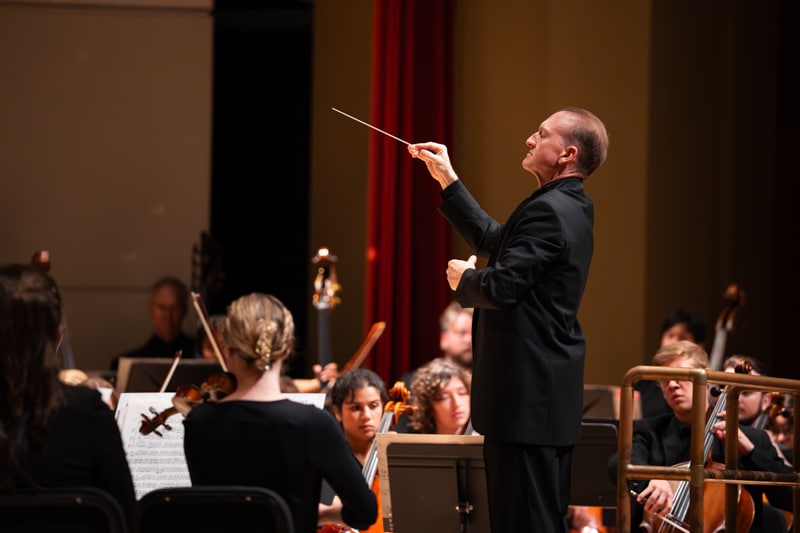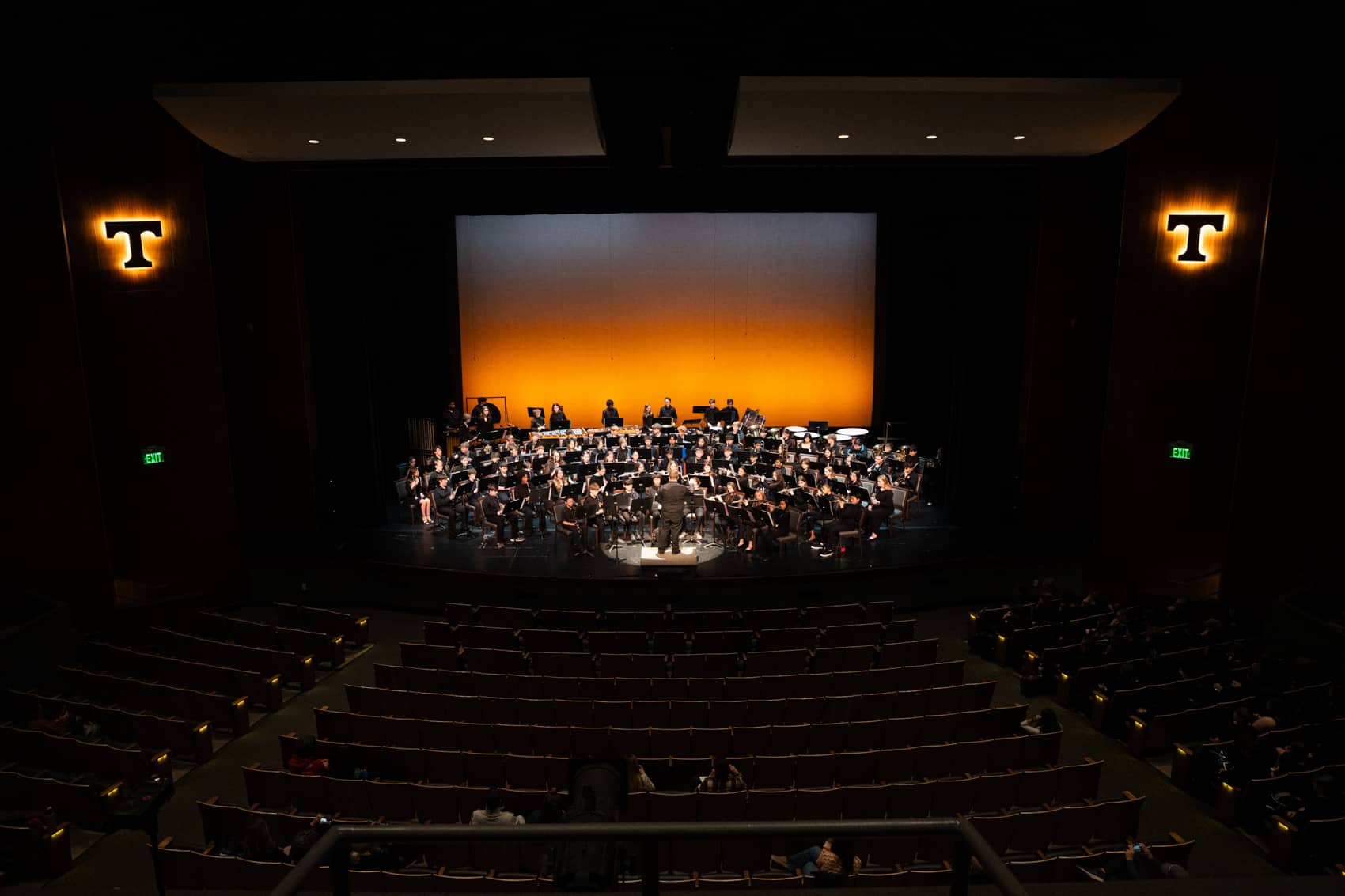
Music, MM Concentration
Instrumental Conducting
Inspire musical excellence from the podium.
Program Overview
The MM in Instrumental Conducting is a selective, hands-on graduate program designed for musicians who are ready to refine their craft as conductors, leaders, and educators. Whether your focus is orchestral or wind ensemble conducting, this program combines intensive podium time, personalized mentorship, and rigorous academic study to prepare you for advanced conducting roles in performance or education.
You’ll work closely with conducting faculty and instrumental studios while gaining experience leading rehearsals, conducting full ensembles, and engaging deeply with score analysis, rehearsal technique, and ensemble leadership.
Students may choose an emphasis in either Orchestral Conducting or Wind/Band Conducting, each with unique repertoire, performance opportunities, and faculty mentorship.
Meet our world-class instrumental conducting faculty
Two Tracks
Students may choose an emphasis in either Orchestral Conducting or Wind/Band Conducting, each with unique repertoire, performance opportunities, and faculty mentorship.

Orchestral Conducting
Students in the orchestral emphasis gain hands-on experience with our Symphony Orchestra and Chamber Orchestra, conducting works from across the classical and contemporary repertoire. You’ll work directly with faculty, receive feedback from studio members, and participate in ensemble programming and rehearsal planning.

Wind/Band Conducting
The wind/band emphasis focuses on advanced training in conducting wind ensembles, symphonic band, and athletic bands. You’ll assist with rehearsals, help lead performances, and dive into wind repertoire, score preparation, and educational methods relevant to collegiate and secondary band programs.
Why study Instrumental Conducting?
- Individualized mentorship and conducting lessons with experienced faculty
- Regular podium time with university ensembles
- Emphasis on score study, rehearsal preparation, conducting technique, and interpretive skills
- Opportunities to assist with major ensemble rehearsals, concerts, and tours
- Collaborative work with applied faculty, student performers, and guest artists
- Strong preparation for doctoral study or professional conducting careers
What can you do with an Instrumental Conducting concentration after graduation?
Graduates of the MM in Instrumental Conducting pursue careers as:
- Conductors and assistant conductors for professional or collegiate ensembles
- Directors of bands or orchestras at secondary or postsecondary institutions
- Music educators and clinicians
- Doctoral students in conducting or music education
Featured Courses
Specific courses are dependent on the student’s MM concentration. Visit our Graduate Degree Requirements for more information.
MUSC 510 Critical Studies in Research Methods and Music Scholarship
Reinforces key research and writing skills for graduate students in music. Engages critically with how knowledge about music is constructed. Introduces research methods, reviews the formatting requirements of the APA and CMOS style manuals, and explores issues of representation that emerge from scholarly discourse and musical practice.
MUIN 590 Advanced Instrumental Conducting
Physical techniques of conducting, study and analysis of scores, rehearsal techniques. Attention to individual problems.
Meet the Faculty
The members of the University of Tennessee conducting faculty are in frequent demand as guest conductors both nationally and internationally, clinicians for masterclasses and residencies, and as adjudicators for competitions.
James Fellenbaum
Associate Professor of Conducting, Director of Orchestras

Admissions and Aid
Choosing the right university to pursue an advanced music degree is an important decision and a significant investment. We want to make sure that you have the information you need to both apply and make attending UT affordable.
There is a Wind/Band Graduate Teaching Assistantship open for 2026-2027. Click the link to learn more.

